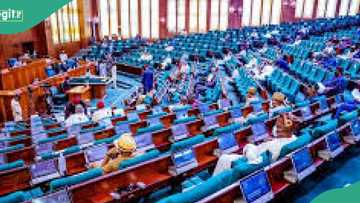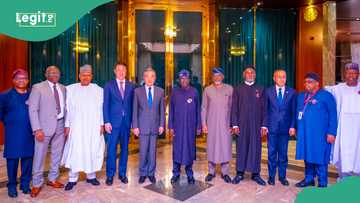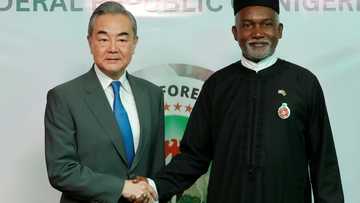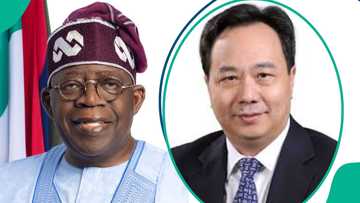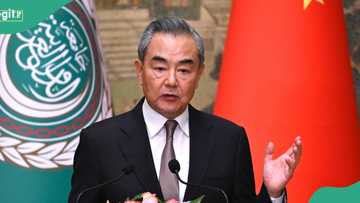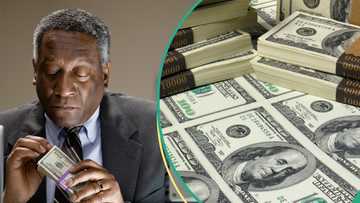Wang Yi’s Africa Tour: Should Nigeria be Afraid of China?
Chinese Foreign Minister Wang Yi visited Nigeria on Thursday, January 9, as part of his tour of Africa.
The tour started on Monday, January 6, with his visits to Namibia, the Republic of Congo, and Chad before ending in Africa’s most populous country. While Beijing said Wang's visit was at the invitation of Nigeria and others, experts say it was a follow-up to the agreements reached at the Forum on Chinese-Africa Cooperation (FOCAC) in 2023.
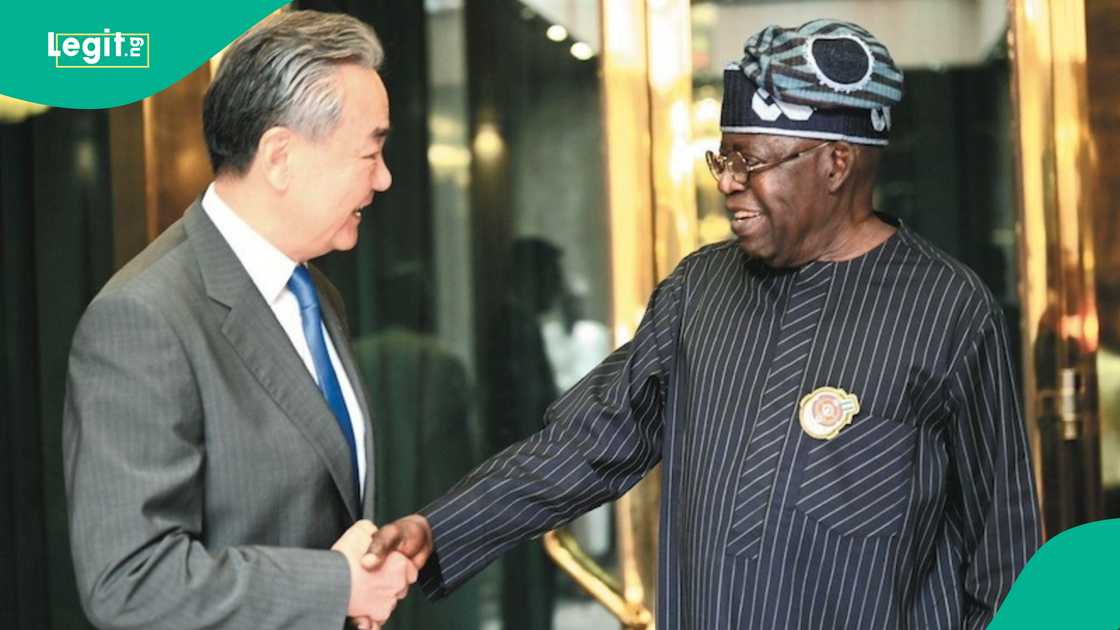
Source: Facebook
China's presence in Nigeria is expanding at a remarkable pace, particularly in infrastructure development and trade partnerships. Over the years, the East Asian power has provided Nigeria with infrastructure loans through its state-owned banks.
Some of the China-backed signature projects in the country include the construction of Standard Gauge Railways (SGRs) connecting major cities in Nigeria, such as Lagos–Ibadan, Abuja–Kaduna, Idu–Kaduna, Abuja Light Rail, and Lekki Deep Seaport. The China Development Bank, a major policy bank, recently approved another loan for another rail project in Nigeria. The bank agreed to grant an initial €245 million (US$253.7 million) tranche of funding for the Kaduna-Kano rail project.
Besides, China is one of Nigeria’s top trade partners: the trade between the two nations amounted to N683 billion in Quarter 3, 2024.
While China-backed infrastructure developments in Nigeria have been commendable, there are growing concerns that Africa’s economic powerhouse is becoming overly indebted to Beijing. Data from the Nigerian Debt Management Office (DMO) cited by China Global South Project indicates that Nigeria’s debt obligations to China increased by almost half a billion dollars to $5.16 billion in the second half of 2023.
The growing influx of Chinese infrastructure loans into Nigeria has raised concerns, particularly after a poorly managed contract between the Ogun state government and Chinese investors resulted in the seizure of Nigeria's presidential jets. Yet, Abuja has shown no signs of pulling back, as evidenced by Wang's recent visit.
Is Nigeria at risk of being overly indebted to China?
In an exclusive interview with Legit.ng, Rasheed Akinkuolie, a former director of Trade, Investment, and Policy at Nigeria’s Ministry of Foreign Affairs, condemned the country’s borrowing spree, which he said has contributed significantly to the decline of its economy through debt servicing.
Ambassador Akinkuolie, who is also a former Consul to Cameroon and Delegate to the World Expo and Economic Development Center in Paris, advised Nigeria to choose “oil-for-project” as an alternative to borrowing. He told Legit.ng in an exclusive interview:
“In 2007, China signed an MOU during the administration of President Obasanjo to trade Oil for Project. China would, in this wise, refurbish the Kaduna refinery and build significant railway networks across the country, among other projects.
“The MOU was not concluded, and subsequent administrations did not push it to the point of implementation.
“This was a smart way of funding infrastructures without borrowing. The present administration must revive the MOU to minimize Nigeria’s debt burden, which will reduce graft and corruption in contract awards.
“This should apply not only to China but also to other countries involved in the development of infrastructure in Nigeria. Nigeria's heavy debts should be offset with crude oil swaps outside the normal market sales.
“Nigeria’s borrowing spree has contributed significantly to the decline of the country’s economy through debt servicing, and such borrowed funds are invariably embezzled without implementing any project. Nigeria must choose the oil-for-project option (that is, exchanging oil for infrastructure) as an alternative to borrowing.”
Could Nigeria face the risk of excessive reliance on China?
Beyond concerns over mounting debt, questions about Nigeria's increasing reliance on China for its development are also being raised. At the 2023 China-Africa cooperation summit, Chinese President Xi Jinping met with about 50 African leaders, including Nigeria's President Bola Tinubu. He promised the continent $50 billion in aid over three years.
However, during Wangi’s visit to Abuja, Tinubu said the $50 billion aid package was insufficient and called for an upward review. The Nigerian leader also urged Beijing to increase the $2 billion currency swap between Nigeria and China to enhance trade between the two countries.

Read also
Diezani Alison-Madueke: ‘US suspicious of FG,’ Senator Yusuf speaks as America returns $52m
Additionally, Nigeria’s foreign affairs minister Yusuf Tuggar said during Wang’s visit that Nigeria is deepening its security partnership with China for local arms production and military training. This is as Wang pledged Beijing’s full support for initiatives aimed at enhancing the continent’s security, including a CN¥1bn ($136 million) military assistance package.
This also includes training 6,000 military personnel and 1,000 police and law enforcement officers for various African countries and supporting the African Standby Force and rapid response forces.
Is there a risk of Nigeria (an Africa) being overly dependent on China? Legit.ng asked Akinkuolie.
The former envoy’s response indicates that he believes otherwise. He said Nigeria is not only focused on China, noting that President Tinubu is also reaching out to other countries, perhaps to avoid over-reliance on one.
“Nigeria is reaching out not only to China but also to other countries. The President was in Saudi Arabia, France, Brazil, and other foreign countries to source FDI. Russia is involved in reviving the Iron and Steel industry, and France is set to invest 6 billion USD in the oil and gas industry in the next few years.
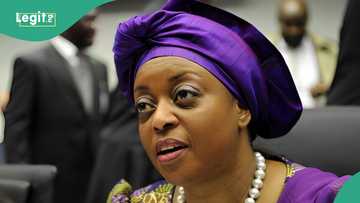
Read also
Breaking: US govt returns ex-minister Diezani's $52.88 million assets to Nigeria, details emerge
“Nigeria's foreign policy is balanced, based on the country's interests at a given time,” the diplomat told Legit.ng.
International affairs analyst Frisk Larr shares Akinkuolie’s sentiment.
“The question of Nigeria being overly dependent on China will not arise at this stage since it has not been dependent on the West after all the years of interactions,” Larr told Legit.ng.
“If Nigeria did not become overly dependent on the West (as its ability to freely navigate its way towards China is showing), then it will take much more to get addicted to China. For now, we do not know the terms of the current loan Nigeria has taken from China. However, given the known fact of China's less draconian interest rates, I do not see a drift towards dependency.
“The fact that China and Russia now exist as active alternatives to the West actually strengthens the hands of poorer countries. Nigeria's priority, first and foremost, must be to boost its own economic autonomy and invest domestically in critical infrastructure.
“Wherever the help of foreign powers is required, Nigeria must be able to look over the shoulders of such powers to learn from them and plan for self-sustainment in the long run. That is what placed China where it is today. Nigeria must work hard to ensure the existence of both sides (The West and the East) on its horizon to avoid outright dependency on any of them. Of course, corruption and ineptitude will always be a stumbling block.”
Could Nigeria's Relationship with China Strain Its Ties with the West?
As Nigeria deepens its ties with China, questions arise about the potential impact on its longstanding relationships with Western nations. But Akinkuolie believes there is no cause for concern.
“China’s presence in Nigeria is relatively recent, and its areas of interest are different from those of Western countries – although China is expanding to other sectors of the economy,” he said.
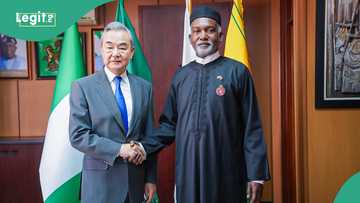
Read also
Yi's visit: List of 5 MoUs signed between Nigeria and China as Minister Tuggar gives update
“The British presence in Nigeria from colonial times dates back well over 100 years. British interests in commerce, through the United African Company (UAC), 1879, Unilever, 1929, First Bank,1894, Union Bank 1917, and Nigeria Railways since 1898, are well established in Nigeria. Nigerian Breweries, Guinness, Unilever, and John Holt are well-established in Nigeria. The commodity market is in London. All of these make British interests in Nigeria stand on solid ground.
“France's interests are in oil and gas through Total Energies, Lafarge Africa, Danone Dairies, Schneider Electric, etc. German companies such as Bilfinger Julius Berger, Siemens, Merck, Bayer, and Thyssen Krupp are active in Nigeria. USA interests in Nigeria are in banking and humanitarian work through individuals such as Bill Gates and his anti-malaria and anti-polio campaigns.
“In essence, Western interests are not radically in conflict with Chinese business interests in Nigeria. The reality is that most European countries and the USA are heavily indebted, with multiple internal crises, such as unemployment, inflation, an ageing population, and involvement in expensive foreign wars.
“China, on the contrary, focuses on business and not politics. China is highly solvent, which makes it possible to invest not only in Nigeria but all over the world. Most of the multinational companies in Europe and America have relocated their factories to China to benefit from a relatively cheap and skilled labour force.”
What should Nigeria prioritize in its negotiations with China?
China’s infrastructure interests in Nigeria have been mostly visible in the railway sector. In 2024, during a state visit to China, President Tinubu signed five MOUs with Chinese President Xi Jinping.
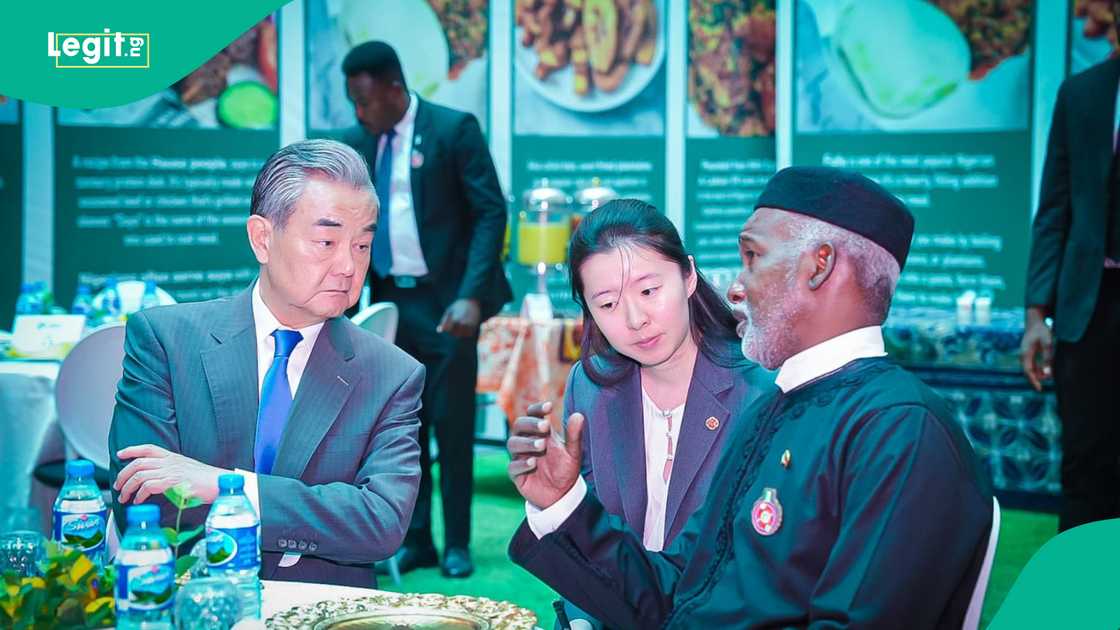
Source: Twitter
The MOUs included a cooperation plan between Nigeria and China on jointly promoting the Belt and Road Initiative, cooperation in the peaceful application of nuclear energy, strengthening cooperation on human resource development under the global development initiative, media exchange and cooperation, and an MoU between China Media Group and the Nigerian Television Authority (NTA).
Akinkuolie said Nigeria desperately needs investments in critical sectors, including roads and the railway system. However, the ex-envoy advised Abuja to focus more on power generation and dam construction in its relationship with China.
“Nigeria's most pressing problem, which the Chinese can resolve, and Nigeria must request, is for China to build the withholding dam on River Benue to stop the annual floods in Nigeria whenever excess water in the Lagdo dam, built by the Chinese in 1982, is released,” he said.
“China offered to build the withholding dam, which has thrice the capacity of the Lagdo dam, in Nigeria. However, the offer was not taken due to Nigeria's incessant change of government. The damage done to communities from year to year in Nigeria as a result of the floods is colossal.
“Another request is to seek support for the power sector. It is now obvious that Nigeria cannot solve the problem of electricity supply by itself without foreign support. And without electricity, the country cannot develop in any meaningful way.
“Gencos (Electricity Generation Companies) and Discos (Electricity Distribution Companies) can't do it, and such a critical sector cannot be left in the hands of amateurs. The Chinese and other countries, including the French government and other friends of Nigeria, should be approached for help.
“I was in Côte d’Ivoire for four years, and there was no power failure, not even once. I was also in Cameroon for three years without a single day or extended hours of power cut. Electricity supply in these countries is taken for granted.
“I discovered that power generation and distribution in most francophone countries are done by Bouygues Construction Company. When I was posted to Paris, I met the Director of the company, Mr Deutsch, to discuss the possibilities of doing the same for Nigeria. He referred me to Finagestion, a subsidiary of Bouygues company. I had a series of meetings with Finagestion, and a comprehensive report was sent to MFA and relevant agencies for further action.
“The efforts did not produce any results. The solution to Nigeria's vexatious power problem must be sought from different countries.”
China cuts back on loans to Africa
In another report, Chinese sovereign credit to Africa decreased to around $1 billion in 2022, the lowest level in over two decades.
This highlights Beijing's turn away from a decades-long big-ticket infrastructure splurge on the continent.
Data from Boston University's Global China Initiative show that finance has reduced as several African nations struggle with debt issues while China also faces its own economic difficulties.
PAY ATTENTION: Сheck out news that is picked exactly for YOU ➡️ find the “Recommended for you” block on the home page and enjoy!
Source: Legit.ng

Nurudeen Lawal (Head of Politics and Current Affairs Desk) Nurudeen Lawal is an AFP-certified journalist with a wealth of experience spanning over 8 years. He received his B/Arts degree in Literature-in-English from OAU. Lawal is the Head of the Politics/CA Desk at Legit.ng, where he applies his expertise to provide incisive coverage of events. He was named the Political Desk Head of the Year (Nigeria Media Nite-Out Award 2023). He is also a certified fact-checker (Dubawa fellowship, 2020). Contact him at lawal.nurudeen@corp.legit.ng or +2347057737768.

Ezra Ukanwa (Politics and Current Affairs Editor) Ezra Ukanwa is a Reuters-certified journalist with over 5 years of professional experience. He holds a Bachelor of Science in Mass Communication from Anchor University, Lagos. Currently, he is the Politics and Current Affairs Editor at Legit.ng, where he brings his expertise to provide incisive, impactful coverage of national events. Ezra was recognized as Best Campus Journalist at the Anchor University Communications Awards in 2019 and is also a Fellow of the Nigerian Institute of Management (NIM). Contact him at: ezra.ukanwa@corp.legit.ng or +2349036989944



